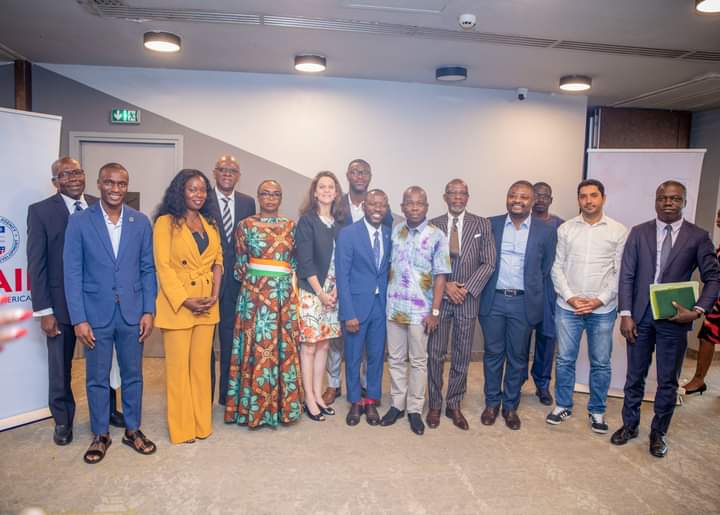Coliba AFRICA aim to revolutionize recycling in Côte d’Ivoire and beyond
By Fatima Datt, Communication Specialist
Plastic pollution is a growing problem worldwide. In the nation of Côte d’Ivoire, which recycles roughly 3 percent of its used plastic, the impact of this problem is apparent. With a population of over five million, Abidjan alone produces 290 tons of plastic waste daily, most of which ends up in the natural environment. Coliba AFRICA, a company specialized in the collection and recycling of plastic, is seeking to change that reality, not just for the nation, but throughout West Africa.
Created in 2017 and based in Abidjan, Coliba aims to structure and industrialize the recycling of plastic waste in Africa through the deliberate recruitment and employment of women and the use of mobile technologies. To that end, the company has developed a mobile app that connects households and small businesses to informal waste collectors. In exchange for plastic waste, households receive points that can be converted into basic foods—while the collectors get paid. The collected plastic waste is transformed into high-quality flakes that can be used in plastic manufacturing and food-grade packaging.
With the unique goal of helping women realize and pursue the opportunities made available through this growing and profitable sector, Coliba makes intentional efforts to attract and train female staff and waste collectors. This is reflected in the fact that the company’s management team and senior management are made up of 42 percent women and over 80 percent of its full-time employees are women.
Coliba is also implementing a program to identify and train 6,000 plastic waste collectors in four cities (Abidjan, Tiassalé, Yamoussoukro, and Bouaké) with the aim of improving the practical knowledge of collectors, creating sustainable jobs, and generating regular income. In December 2021, the USAID-funded West Africa Trade & Investment Hub partnered with Coliba through a co-investment grant award to establish and implement this training and capacity-building project, which will fully integrate the informal waste collectors into a sustainable value chain. The partnership will allow Coliba to add 250 direct full-time jobs, with 70 percent of those positions being occupied by women.
To mark the beginning of the training project—the first of its kind for informal plastic waste collectors in Côte d’Ivoire—Coliba organized an official launching ceremony on July 8, 2022. Taking place at the Pullman Hotel in Abidjan Plateau, the ceremony was attended by many notable guests: representing Côte d’Ivoire’s Minister of Technical Education, Vocational Training, and Apprenticeship—Mr. Amara, Technical Director; representing the Minister of Environment and Sustainable Development—Mr. Dagnogo Sidi Braima, Director General of Environment; the Mayor of Tiassalé, Mr. Assalé Timoko; and the Representative of USAID/Côte d’Ivoire, Ms. Nancy Lowenthal. As the collection and management of waste in Africa, and therefore, in Côte d’Ivoire, is a challenge for governments at the political, social, environmental, and economic levels, it was important for Coliba to hold this event and provide an opportunity for all stakeholders to meet, dialogue, and further connect.

Since the start of the co-investment partnership, 1,614 collectors in the target areas have been trained to increase their knowledge and skills in recycling. Concurrently, the company has increased the number of collection points where collectors can be paid for their plastic waste, with a total of 22 collection centers (kiosks) set up throughout the city. Further, Coliba has exceeded its initial goal of installing 100 recycling collection boxes where residents can dispose of their plastic waste. There are now more than 135 of these recycling collection boxes in place at gas stations and supermarkets in Abidjan and neighboring towns. As a result of these trainings and increased number of kiosks and other recycling collection boxes, there has been a significant increase in the amount of plastic collected, leading to an improvement in the collectors’ incomes.
Regarding the mobile app technology, beyond allowing users to make collection requests and redeem points to receive basic food products, the app also highlights the locations of the nearby recycling collection boxes, and provides recycling-related news from around the continent. Coliba’s efforts to change the community’s view of and participation in recycling extends further into homes as the company provides an awareness program to schools called “Protect your Planet.” Raising awareness of the dangers linked to plastic pollution and to promoting eco-friendly actions by committing to a goal of zero plastic waste in the school environment, this program is ensuring that the next generation is equipped with the mindset and habits to actively be a part of the solution to the problem of plastic pollution.
By the end of its co-investment project with the Trade Hub (April 2024), Coliba AFRICA expects to have trained and improved the incomes of 6,000 plastic waste collectors, installed 65 kiosks, and built a recycling plant with a capacity of 15,000 tons per year.
Plastic being one of the most persistent pollutants on Earth, its collection and recycling has a considerable impact in reducing greenhouse gas emissions that contribute to global warming. When efforts are made to reduce the amount of waste found in the environment, the quality of life for those who live in those communities also improves. For Coliba, proliferating these positive impacts throughout Côte d’Ivoire is a purposed pursuit that, through a true collective effort, is changing lives and protecting the environment.

